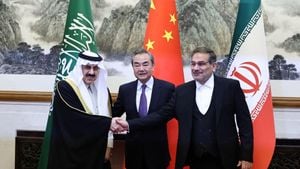President Donald Trump made headlines at the Conservative Political Action Conference (CPAC) held on February 22, 2025, where he openly expressed his dissatisfaction with both Mexico and Canada. The remarks came as the president addressed issues surrounding tariffs imposed on China due to its role as a key player in the trafficking of fentanyl, highlighting the deepening tensions between the U.S. and its northern neighbors.
During his address, Trump stated, "No estoy contento con México ni con Canadá" (I am not happy with Mexico nor Canada). Such remarks signal Trump's continued focus on international relations and trade policies, especially those impacting the opioid crisis, which has affected countless Americans. The president's reference to tariffs draws attention to his administration's aggressive stance toward foreign nations viewed as contributors to drug trafficking.
Trump's comments were contextualized within the larger fantasy of his administration's hardline policies on trade and national security, particularly concerning the opioid epidemic, which has claimed thousands of lives across the United States. The fentanyl crisis has been exacerbated by illicit drugs crossing the border, often sourced from countries like China and trafficked through Mexico.
The president's criticisms of Mexico and Canada are not new; they have been recurrent themes during his presidency. For years, he has blamed neighboring countries for what he perceives as their failures to adequately manage drug trafficking routes and enforce border security. This latest outburst has reignited discussions among political analysts and pundits about the future of U.S. relations with its neighbors.
Trade dynamics have always played a pivotal role in U.S.-Mexico and U.S.-Canada relations, with NAFTA (now USMCA) often being at the forefront of discussions. The changes under the Trump administration to these trade agreements have sent ripples through the economies of both countries. Trump's latest sentiments could very well influence upcoming negotiations and enforce stricter provisions as they relate to drug trafficking and trade tariffs.
Critics argue Trump's rhetoric could provoke unnecessary hostilities, particularly as the Biden administration looks to revive and stabilize relations with both Canada and Mexico. The recent handling of pandemic responses, economic recovery, and collaborative efforts to combat fentanyl trafficking have been key components of these international relationships.
Experts on international trade and policy see Trump's comments as potentially undermining progress made under previous administrations. They warn of the risks involved when trade is weaponized and point out how such discourse can create barriers to addressing more pertinent global issues, like public health concerns surrounding narcotic use.
Considering the delicate balance of diplomatic relations, Trump's statements ask whether these kinds of outcries against neighboring countries will benefit the United States or if they will instead usher in negative consequences. The potential shift toward isolationism through tariffs and punitive measures risks not only trade relationships but also collaborative efforts necessary to combat the broader challenge of drug trafficking.
Political ramifications from Trump's remarks extend beyond mere trade. Analysts point out how this rhetoric could affect upcoming elections and political strategies within the Republican Party. With many constituents feeling the impacts of the fentanyl crisis, will Republicans support tougher stances on foreign relations, or will there be calls for reform and collaboration?
Overall, Trump's latest comments at CPAC serve as another barometer of the shifting political climate related to international relations under his administration. Whether seen through the lens of nationalist fervor or economic pragmatism, the call for accountability from neighboring countries fits squarely within Trump's overarching agenda. It remains to be seen how this will play out on the international stage and what precedents it might establish for future leaders.



